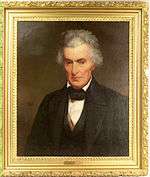Felix Robertson


Felix Robertson (1781–1865) was an American pioneer, physician and Jeffersonian Republican politician.[1][2][3][4][5][6][7] He served twice as the Mayor of Nashville, Tennessee from 1818 to 1819 as well as from 1827 to 1829.[1][2][4][5][6][7]
Biography
Early life
Felix Robertson was born on January 11, 1781 at the fort Freeland's Station, which was later commemorated as a neighborhood of Nashville.[1][7] He was born to General James Robertson and his wife Charlotte Reeves Robertson, who had arrived with the first large group of settlers in Middle Tennessee.[3][4][7] He was the first known white child born in the settlement now called Nashville, while his father is regarded as the "Father of Tennessee" in history books.[3][5]
Career
Robertson studied medicine under the direction of Benjamin Rush at the University of Pennsylvania, where he received his M.D. degree in 1806.[6][7] He went on to practice medicine in Nashville for forty years.[6] He served as Mayor of Nashville from 1818 to 1819 as well as from 1827–1829.[1][4] He later took part in Robertson's Colony with his cousin Sterling C. Robertson, but they returned to Tennessee.[1][7] He delivered a speech at the 26th annual meeting of the Tennessee Medical Society detailing the early physicians and medical practices in the early settlement of Nashville.[3] He went on to work as a professor of medicine at the former University of Nashville.[4][5] He served as director of the Medical Society of Tennessee from 1834 through 1840 and again in 1853 for two years.[6] He was a close friend and personal doctor of President Andrew Jackson (1767–1845).[6] He worked on his 1828 presidential campaign.[6]
Personal life
He married Lydia Waters on October 9, 1808.[1] They had five sons, James Waters, Benjamin, John E. Beck, Felix (died as infant), and Felix Randolph, and two daughters, Elizabeth, Elnora Reeves.[1] He died on July 10, 1865, and he is buried in the Nashville City Cemetery.[1][3][5][7] His tombstone is inscribed with the epitaph "First white child born in settlement now called Nashville; Distinguished as a physician; Foremost as citizen."[8]
His son, James Waters Robertson (1812-1836), went to Texas from Louisiana, took part in the Siege of Bexar during the Texas revolution and later served in the Alamo garrison. He died in the Battle of the Alamo on March 6, 1836.[9]
Legacy
His portrait, painted by Washington Bogart Cooper in July 1839, hangs in the Tennessee State Museum in Nashville.[3]
See also
References
- 1 2 3 4 5 6 7 8 Friends of Metropolitan Archives of Nashville and Davidson County, TN
- 1 2 Nashville Library
- 1 2 3 4 5 6 Tennessee Portrait Project
- 1 2 3 4 5 Jeanette T. Acklen, Tennessee Records: Tombstone Inscriptions and Manuscripts, Genealogical Publishing Com, 2009, p. 7
- 1 2 3 4 5 E. D. Thompson, Nashville Nostalgia, Westview Publishing Co., 2003, p. 17
- 1 2 3 4 5 6 7 Nashville City Cemetery, Mayors
- 1 2 3 4 5 6 7 Malcolm D. McLean, "ROBERTSON, FELIX," Handbook of Texas Online (http://www.tshaonline.org/handbook/online/articles/fro25), accessed March 25, 2013. Published by the Texas State Historical Association.
- ↑ Nashville City Cemetery
- ↑ Bill Groneman, "ROBERTSON, JAMES WATERS," Handbook of Texas Online (http://www.tshaonline.org/handbook/online/articles/frobz), accessed September 27, 2014. Uploaded on June 15, 2010. Published by the Texas State Historical Association.
| Political offices | ||
|---|---|---|
| Preceded by Stephen Cantrell, Jr. |
Mayor of Nashville, Tennessee 1818-1819 |
Succeeded by Thomas Crutcher |
| Preceded by Wilkins F. Tannehill |
Mayor of Nashville, Tennessee 1827-1829 |
Succeeded by William Armstrong |